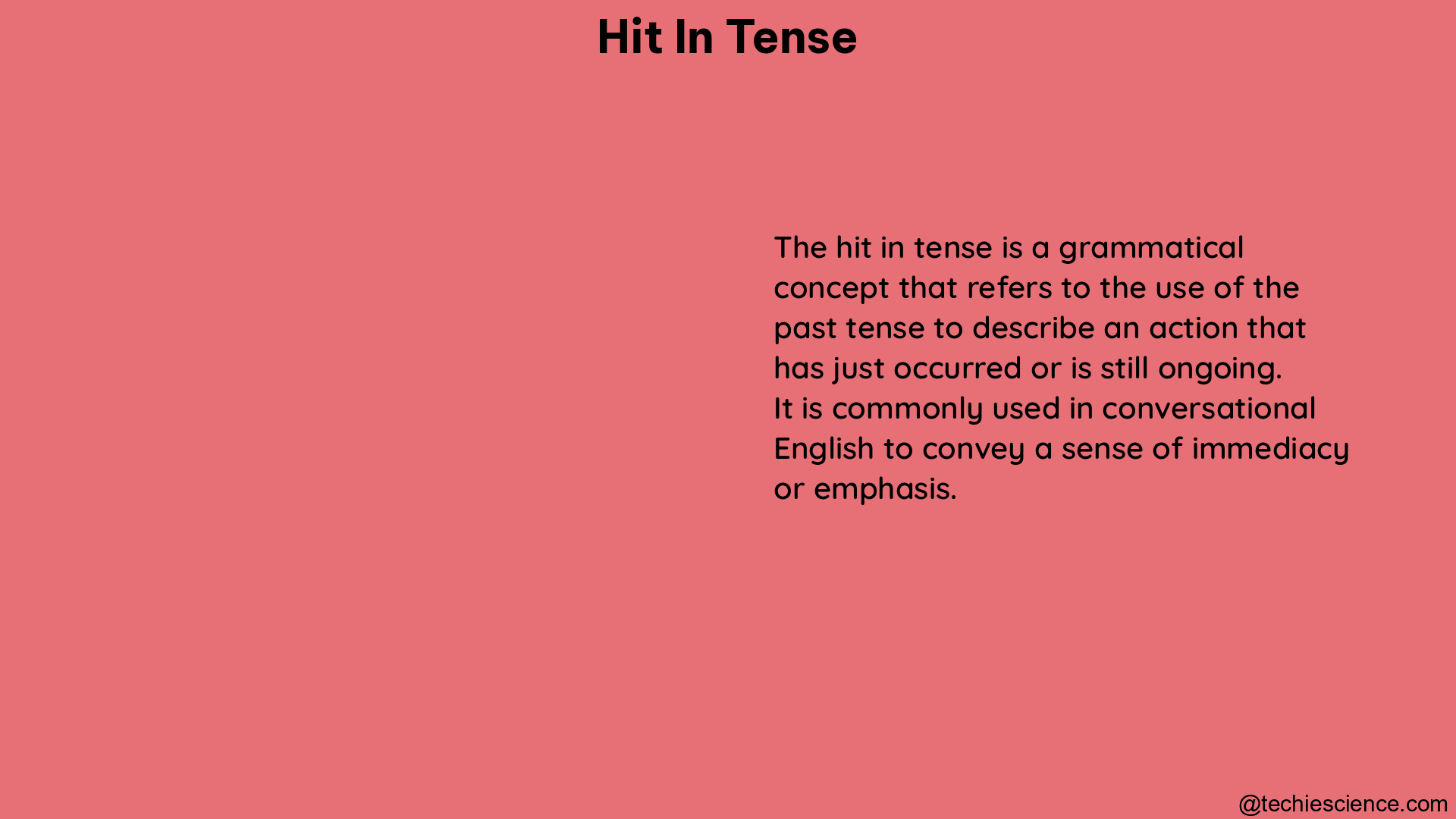The verb “hit” is an irregular verb in the English language, meaning its past tense form remains the same as the base form. Understanding the conjugations and usage of “hit” across various tenses is crucial for effective communication and proper grammar. This comprehensive guide will delve into the intricate details of the verb “hit” in different tenses, providing a valuable resource for English language learners and enthusiasts.
The Present Tense of “Hit”
In the present tense, the conjugations of the verb “hit” are as follows:
| Subject | Verb Form |
|---|---|
| I | hit |
| You | hit |
| He/She/It | hits |
| We | hit |
| You | hit |
| They | hit |
Examples:
– I hit the target with precision.
– She hits the ball with great force.
– We hit the gym every day.
The Past Tense of “Hit”

The past tense of the verb “hit” remains the same as the base form, making it an irregular verb. The conjugations are as follows:
| Subject | Verb Form |
|---|---|
| I | hit |
| You | hit |
| He/She/It | hit |
| We | hit |
| You | hit |
| They | hit |
Examples:
– I hit the nail on the head.
– They hit the jackpot with their latest investment.
– The car hit the tree, causing significant damage.
The Present Progressive Tense of “Hit”
The present progressive tense of the verb “hit” is formed by using the present tense of the verb “to be” and the present participle of the verb “hit” (i.e., “hitting”).
| Subject | Verb Form |
|---|---|
| I | am hitting |
| You | are hitting |
| He/She/It | is hitting |
| We | are hitting |
| You | are hitting |
| They | are hitting |
Examples:
– I am hitting the ball with all my might.
– She is hitting the keys on the keyboard rapidly.
– They are hitting the road for a long-awaited road trip.
The Past Progressive Tense of “Hit”
The past progressive tense of the verb “hit” is formed by using the past tense of the verb “to be” and the present participle of the verb “hit” (i.e., “hitting”).
| Subject | Verb Form |
|---|---|
| I | was hitting |
| You | were hitting |
| He/She/It | was hitting |
| We | were hitting |
| You | were hitting |
| They | were hitting |
Examples:
– I was hitting the ball when I twisted my ankle.
– She was hitting the high notes with ease during the performance.
– They were hitting the gym regularly to stay in shape.
The Present Perfect Tense of “Hit”
The present perfect tense of the verb “hit” is formed by using the present tense of the verb “to have” and the past participle of the verb “hit” (i.e., “hit”).
| Subject | Verb Form |
|---|---|
| I | have hit |
| You | have hit |
| He/She/It | has hit |
| We | have hit |
| You | have hit |
| They | have hit |
Examples:
– I have hit the target every time during the competition.
– She has hit the jackpot with her latest business venture.
– We have hit the gym consistently for the past few months.
The Past Perfect Tense of “Hit”
The past perfect tense of the verb “hit” is formed by using the past tense of the verb “to have” and the past participle of the verb “hit” (i.e., “hit”).
| Subject | Verb Form |
|---|---|
| I | had hit |
| You | had hit |
| He/She/It | had hit |
| We | had hit |
| You | had hit |
| They | had hit |
Examples:
– I had hit the ball out of the park before the rain started.
– She had hit the deadline for the project before the client’s request.
– They had hit the road for their vacation before the traffic started.
The Future Tense of “Hit”
The future tense of the verb “hit” is formed by using the auxiliary verb “will” and the base form of the verb “hit”.
| Subject | Verb Form |
|---|---|
| I | will hit |
| You | will hit |
| He/She/It | will hit |
| We | will hit |
| You | will hit |
| They | will hit |
Examples:
– I will hit the gym after work today.
– She will hit the target with her new bow and arrow.
– They will hit the road for their cross-country adventure.
The Future Progressive Tense of “Hit”
The future progressive tense of the verb “hit” is formed by using the auxiliary verb “will” and the present participle of the verb “hit” (i.e., “hitting”).
| Subject | Verb Form |
|---|---|
| I | will be hitting |
| You | will be hitting |
| He/She/It | will be hitting |
| We | will be hitting |
| You | will be hitting |
| They | will be hitting |
Examples:
– I will be hitting the ball during the game tomorrow.
– She will be hitting the keys on the piano for her recital.
– They will be hitting the trails for their hiking trip.
The Future Perfect Tense of “Hit”
The future perfect tense of the verb “hit” is formed by using the auxiliary verb “will” and the past participle of the verb “hit” (i.e., “hit”).
| Subject | Verb Form |
|---|---|
| I | will have hit |
| You | will have hit |
| He/She/It | will have hit |
| We | will have hit |
| You | will have hit |
| They | will have hit |
Examples:
– I will have hit the target by the time the competition ends.
– She will have hit the deadline for the project before the client’s visit.
– They will have hit the road for their vacation before the traffic starts.
The Future Perfect Progressive Tense of “Hit”
The future perfect progressive tense of the verb “hit” is formed by using the auxiliary verb “will,” the past participle of the verb “to have” (i.e., “have”), and the present participle of the verb “hit” (i.e., “hitting”).
| Subject | Verb Form |
|---|---|
| I | will have been hitting |
| You | will have been hitting |
| He/She/It | will have been hitting |
| We | will have been hitting |
| You | will have been hitting |
| They | will have been hitting |
Examples:
– I will have been hitting the gym regularly by the time the summer arrives.
– She will have been hitting the books hard to prepare for the final exams.
– They will have been hitting the road for their cross-country trip for several days by the time they reach their destination.
The Conditional Tense of “Hit”
The conditional tense of the verb “hit” is formed by using the auxiliary verb “would” and the base form of the verb “hit.”
| Subject | Verb Form |
|---|---|
| I | would hit |
| You | would hit |
| He/She/It | would hit |
| We | would hit |
| You | would hit |
| They | would hit |
Examples:
– I would hit the gym if I had more time.
– She would hit the target if she had a better aim.
– They would hit the road for a vacation if they had the budget.
The Imperative Form of “Hit”
The imperative form of the verb “hit” is the base form of the verb.
| Imperative Form |
|---|
| Hit |
| Let’s hit |
Examples:
– Hit the ball with all your might!
– Let’s hit the gym after work today.
The Infinitive Form of “Hit”
The infinitive form of the verb “hit” is “to hit.”
| Infinitive Form |
|---|
| to hit |
Examples:
– I want to hit the target with precision.
– She needs to hit the deadline for the project.
Theoretical Explanation
The verb “hit” is considered an irregular verb in the English language because its past tense form remains the same as the base form, rather than following the standard pattern of adding “-ed” to form the past tense. This irregularity is an important aspect to understand for proper usage and conjugation of the verb “hit” in various tenses.
Advanced Details
-
Contextual Usage: The verb “hit” can be used in a variety of contexts, both physical and figurative. For example, it can be used to describe a physical action, such as hitting a ball, or a more abstract concept, such as “hitting a target” or “hitting the books.”
-
Idiomatic Expressions: The verb “hit” is often used in idiomatic expressions, such as “hit the road” (to start a journey), “hit the books” (to study), or “hit the sack” (to go to bed).
-
Phrasal Verbs: The verb “hit” can also be used in phrasal verbs, such as “hit on” (to flirt with someone), “hit up” (to visit or contact someone), or “hit back” (to retaliate).
-
Passive Voice: The verb “hit” can be used in the passive voice, such as “The ball was hit by the player” or “The target was hit by the arrow.”
-
Compound Verbs: The verb “hit” can be combined with other words to form compound verbs, such as “hit-and-run” (to collide with something and then leave the scene) or “hit-and-miss” (to be successful or unsuccessful in a random or unpredictable way).
Reference:
- https://homework.study.com/explanation/what-is-the-past-tense-of-hit.html
- https://www.gymglish.com/en/conjugation/english/verb/to_hit
- https://en.pons.com/verb-tables/english/hit

Hi…..I’m a graduate with a Bachelor’s degree in English Literature. I wish to do a Masters in the same field someday and continue my career in Academia.
Let’s connect through LinkedIn: